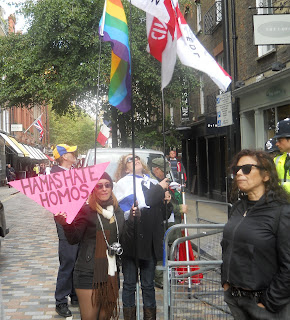





Sir,
I was pleased to see the publication of my article, which expressed my opposition to a total boycott of Israel.
I am, however, concerned that my article was used to juxtapose the article by Nathan Geffen and Doron Isaacs, which called for a boycott of the products of the settlements, Ahava in particular.
As I have said many times in the past, I fully support the boycott of the settlements products. As a matter of fact, Gush Shalom, to which I belong, initiated this boycott in 1998. Therefore I agree with Geffen and Isaacs – kol hakavod to them.
A boycott of the settlements products is an essential step in delineating the boundary between the legitimate State of Israel and the illegal, immoral and totally unacceptable settlements in the occupied territories, which will in future belong to the independent State of Palestine. Without a clear border between Israel and Palestine, peace is impossible and we are doomed to eternal war.
Shalom, Uri Avnery
But Israel has maintained the longest occupation in recent history. It only annexed East Jerusalem, a small but important part of the OPT, but failed to give the Palestinians living there citizenship. Furthermore, in breach of the fourth Geneva Convention, it has allowed and encouraged Israeli citizens to settle in the OPT. The consequence of this is the mess we have to today; a highly cantonised West Bank in which 2 million Palestinians are gradually being forced into a few enclaves to make way for half-a-million settlers. Many of the settlers have moved to the OPT because of economic incentives. A minority are religious zealots. The Palestinians have no meaningful franchise. Their movement is restricted, they suffer sustained human rights abuses, and they are subject to military law while the settlers enjoy the full protection of Israeli civil law. An official policy of separation operates in the West Bank. This is the problem at the frontline of the current Israeli-Palestinian conflict.
A worldwide movement to end the occupation has formed. It has gained momentum in recent years and it has now culminated in calls for boycotts. Some demand a boycott of all Israeli academia, culture and goods; others have called for partial boycotts. We argue that a call to boycott products produced in the West Bank is justified, both morally and strategically.
A boycott is a tactic. It is not a moral call to boycott every product produced by every country with a dubious human rights record. For one thing this is impossible in today’s global economy. Also some boycotts are wrong. For example the embargo on Iraqi goods in the 1990s caused hundreds of thousands of innocent deaths but did not help topple Saddam Hussein. A boycott only works in certain circumstances. The boycott of settlement goods is one such case for three reasons: (1) there is a worldwide movement to end the occupation and so a boycott has some prospect of success, (2) the boycott will cause inconvenience, but it won’t result in deaths, it will help alter policy and save lives on all sides, and (3) Israel, because of the liberal sensibilities of part of its population, and its desire to be recognised as a modern Western democracy, is sensitive to the boycott.
Why boycott Israeli settlement products? Nathan Geffen and Doron Isaacs — first published in the Jewish Report
The reasons for this are that the Occupation is the longest in recent history, smacks of hypocrisy in the face of Israel’s image as a liberal democracy, is undermining the prospects of democratising the whole middle east, and is destabilising the region and the world. Furthermore, the system of separation in the West Bank bares an extremely close resemblance to racial discrimination, which, in the wake of the US civil rights and anti-Apartheid movements is considered a universal evil.
Apologists for the Occupation pose Iran as the main example of a country that should be boycotted if those calling for boycotts are to be consistent. Iran is a destabilising force in the middle-east, particularly in its pursuit of nuclear weapons to match Israel. This does not imply that criticism of Iran’s anti-democratic theocracy should slacken. But in their antagonism to the West the Ayatollahs are more impervious to global moral pressure. Boycotts, like all tactics, are only invoked when they have a chance of success. There is therefore a necessary inconsistency. Nevertheless, what these apologists fail to account for is that there are very strictly enforced sanctions imposed upon Iran, and its clients like Hamas. Israel does not currently experience even a fraction of such sanctions.
The boycott will not bankrupt Israel, but it succeeds in posing the political question in the clearest light: either one supports these illegal settlements, or one is helping to remove them and to end the immoral Occupation. The rationale for a boycott of settlement products is compelling. We hope people throughout South Africa will join this boycott. In the long run, a worldwide strategic and principled boycott of settlement goods will not only help Palestinians realise their rights; it will make Israel a better place for all its people, Jews, Muslims, Christians and others. The leaders of white South Africa discovered this before it was too late. We hope Israeli leaders will too.
Geffen and Isaacs are founding members of Open Shuhada Street, an organisation that supports Israelis and Palestinians working together using non-violent means to end the Occupation.